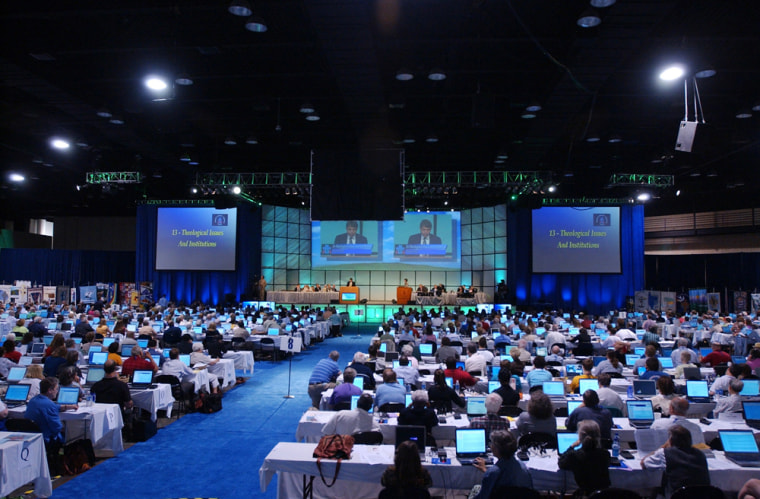The Presbyterian Church national assembly on Wednesday revised a 2-year-old policy on Mideast investments that had provoked protest from grass roots churchgoers and Jewish groups.
To vigorous applause, delegates agreed to a new statement that says Presbyterian holdings pertaining to both Israel and Palestinian territory should “be invested in only peaceful pursuits.”
The 2004 assembly authorized “phased selective divestment in multinational corporations operating in Israel” because of its policies toward Palestinians. Jewish organizations had criticized that action as unfairly one-sided but were content with the new wording.
David Bernstein of the American Jewish Committee’s Washington office, who is observing the assembly, said the resolution “subjects Israel to the same process as every other country in the world. That’s what we wanted. Singling out Israel is not the way to approach peace in the Middle East.”
Mark Pelavin, director of interreligious affairs for Reform Judaism, said the revision “is a critical step toward removing an ugly stain on the church’s history of fighting for peace and justice.”
Church called anti-Semetic for previous policy
Presbyterians haven’t yet pulled any investments but talked with five corporations involved in Israel: Caterpillar, Citigroup Inc., Industries Inc., Motorola and United Technologies Corp.
Conservatives sponsored a talk by lay Presbyterian James Woolsey, a CIA director under President Clinton. He said the 2004 action put his church “clearly on the side of theocratic, totalitarian, anti-Semitic, genocidal beliefs, and nothing less.”
The statement approved 483-28 also urges an end to terror against both Israelis and Palestinians. It says a sovereign state has the right to protect its borders but said the present location of Israel’s security wall “illegally encroaches into the Palestinian territory.”
Assembly backer faces financial difficulties
Meanwhile Wednesday, the assembly was shaken by a report in The Denver Post about financial troubles of Colorado businessman and Presbyterian layman Stanley W. Anderson, who told the assembly last week that he’s contributing $150 million to help struggling congregations and plant new ones.
John Detterick, who retires this month as executive director of the church’s General Assembly Council, told the assembly that he was confident Anderson would make good on his gift, the largest in the history of the 2.3 million-member Presbyterian body.
The Denver Post reported in Wednesday editions that Anderson owes hundreds of thousands of dollars to creditors. A Denver District Court judge ordered Anderson and partner Edwin A. Smith to pay more than $850,000 and froze their assets in 2004 after they were sued over an unpaid loan.
Last year, two lenders began foreclosure proceedings on Anderson’s house and one debt remains, the Post said.
In an interview, Detterick said, “I am disturbed that a person of deep faith is now subject to a very unfortunate public airing of his financial difficulties.”
Program at risk
Anderson’s donation was to fund a program starting in November through the Trinity Foundation, which Anderson and Smith founded in January.
When Anderson appeared last Thursday to announce the gift, the news electrified the assembly, which gave him a standing ovation. He told the assembly he was frustrated by the steady, 40-year decline in membership, and wanted to re-energize the denomination.
Detterick said the church faces no financial exposure since no grants will occur until funding is in place.
“I’m quite confident at that time those who are disappointed will see the money is there and will regain the excitement many of us have about this gift.”
